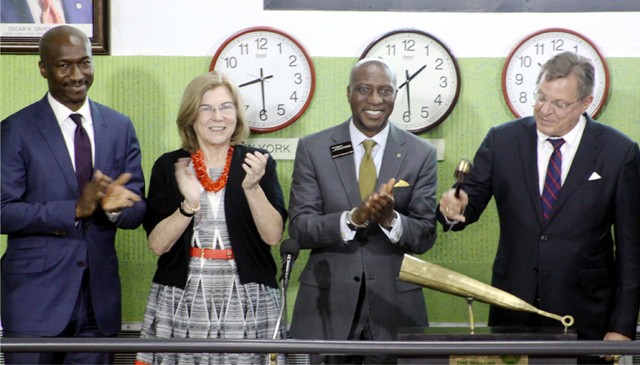Business
NSE Completes Demutualisation Process, April

All is now set for the final conversion of the Nigerian Stock Exchange, NSE, to a public liability company as the process for the demutualisation of the Exchange would be concluded on April 24.
This follows the Court-Ordered Meeting and Extra-Ordinary General Meeting scheduled to hold on March 4, 2020, where members of the Exchange are expected to sanction the planned demutualisation and also approve the appointment of the inaugural Board of Directors.
According to the scheme of arrangement for the demutualisation, the final approval for the demutualisation would be obtained from the Securities and Exchange Commission (SEC) on April 22, 2020.
If the proposed exercise is approved, the Exchange would become the 57th exchange to demutualise among the 70 members of the World Federation of Exchanges.
According to the Scheme of Arrangement between the Exchange and the shareholders/dealing member firms, each dealing member would get 6.01 million ordinary shares, while each ordinary member would get 2.44 million units post-demutualisation.
Following the demutualisation, N1.25 billion comprising 2.5 billion ordinary shares and 2.0 billion ordinary shares of 50kobo each, representing the issued share capital of newly demutualised Nigerian Exchange Group Plc would be registered with the Corporate Affairs Commission (CAC) and the Securities and Exchange Commission (SEC) respectively.
The Scheme of Arrangement showed that a total of 40.83 million ordinary shares, representing two percent of the issued shares of Nigerian Exchange Group, would be set aside for allotment to parties who are adjudged as being entitled to shares in the demutualised Exchange, pursuant to the provisions of the Demutualisation Act 2018.
“The apportionment of two percent as the Claims Review Shares is based on an analysis of the probable quantum of shares that would be required to settle each claim. This was determined given the rigorous and robust process undertaken to verify and confirm the names on the Register,” the Exchange said.
Additionally, 1.96 billion ordinary shares representing about 98 percent of the issued shares and the balance of the issued shares following the reservation of the Claims Review Shares would be distributed between the dealing and ordinary members on the basis of a ratio of 78:22 respectively allotted on equal basis between the dealing and ordinary members.
Post-demutualisation, the Exchange will be better positioned to implement commercial strategies to improve its role as a trading arena and undertake improvements to facilitate more competition. Improvements will allow for efficient, effective and more competitive trading, while improved global trading facilities will maximize economies of scale and scope and increase the Exchange’s accessibility and market reach.
Business
Nigeria’s ETF correction deepens as STANBICETF30, VETGRIF30 see 50% decline in a week

Business
BOI Introduces Business Clinic

Business
Dangote signs $400 mln equipment deal with China’s XCMG to speed up refinery expansion

-
Maritime3 days ago
Nigeria To Pilot Regional Fishing Vessels Register In Gulf Of Guinea —Oyetola
-
Maritime3 days ago
Customs Declares War Against Narcotics Baron At Idiroko Border
-

 Sports3 days ago
Sports3 days agoGombe-Gara Rejects Chelle $130,000 monthly salary
-
Maritime3 days ago
NIMASA,NAF Boost Unmanned Aerial Surveillance For Maritime Security
-

 Sports3 days ago
Sports3 days agoTEAM RIVERS SET TO WIN 4×400 ” MORROW” …Wins Triple jump Silver
-
Maritime3 days ago
NIWA Collaborates ICPC TO Strengthen Integrity, Revenue
-

 Sports3 days ago
Sports3 days agoNPFL Drops To 91st In Global League Rankings
-

 Sports2 days ago
Sports2 days agoNSC eyes international hosting rights

